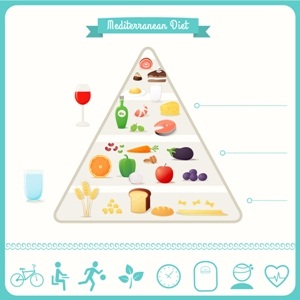
At the beginning of the year, I wrote about the protective effects of what is known as the Mediterranean Diet in relation to dementia and Alzheimer’s Disease.
At that time, shortly before the start of a G8 summit on new approaches to research and treatment of dementia, a team of eleven leading doctors from the G8 countries pleaded with health practitioners that we should emphasise the importance of diet and lifestyle factors and the Mediterranean Diet in particular, in reducing the risk of dementia in global populations. (Collins, 2013)
But the Mediterranean Diet is not only valuable for its protective effect on our brain cells and cognitive function – other studies are providing a growing body of evidence that it can play a vital role in the prevention of heart disease and strokes, diseases which are rife in South Africa.
Spanish study
A very large study was conducted in Spain by the Spanish government to investigate the effect of three different diets: a Mediterranean diet supplemented with extra-virgin olive oil (about 1 litre per week), a Mediterranean diet supplemented with mixed nuts (30g a day, consisting of walnuts, hazelnuts and almonds) or a control diet with a reduced fat content. (Estruch et al, 2013)
Read: Mediterranean diet is brain-healthy
Approximately 7 500 people took part in this mega-study. The subjects were both men and women, aged from 55 to 80, who did not have any signs or symptoms of cardiovascular disease at the point of enrolment, but were regarded as “prime candidates for cardiovascular disease”. This means that they suffered from either type 2 diabetes mellitus (non-insulin dependent diabetes) or had at least 3 major risk factors for the development of cardiovascular disease, namely:
- Smoking
- High blood pressure
- High low-density (LDL or "bad") lipoprotein cholesterol levels and/or low high-density (HDL or "good") lipoprotein cholesterol levels
- Overweight or obesity
- A family history of coronary heart disease
Results
This PREDIMED Study ("Prevencion con Dieta Mediterranea") produced the following positive results:
- The two Mediterranean diet treatments (either supplemented with virgin olive oil or a daily handful of nuts) had a significant protective effect on people who were at risk of developing cardiovascular disease, causing a reduction in the incidence of heart disease or stroke of approximately 30% in the treatment groups.
- It was also found that the Mediterranean Diet groups increased their intake of fish and legumes when compared to the control diet group.
- None of the diet groups changed their physical activity levels or lost significant amounts of weight.
(Estruch et al, 2013)
Conclusions
Dr Estruch and his team (2013), concluded that “Among persons at high cardiovascular risk, a Mediterranean diet supplemented with extra-virgin olive oil or nuts reduced the incidence of major cardiovascular events.”
Read: Olive oil lowers blood pressure
It is interesting to note that the beneficial effects were obtained despite the fact that the two Mediterranean diets were not energy-restricted. In other words, these diets had a positive result although the participants did not lose weight.
It is fascinating to see what foods these two Mediterranean diets included and which foods were discouraged:
Recommended intakes:
- Olive oil (used for cooking, on salads and when eating out) – 4 tablespoons/day [The group that received the olive oil supplement, were encouraged to use 50g a day.]
- Tree nuts and peanuts – 3 servings of 30 g per week [The group that received the nuts, were encouraged to eat 30g a day.]
- Fresh fruit – 3 servings per day
- Vegetables – 2 servings per day
- Fish, especially fatty fish, and seafood – 3 servings per week
- Legumes (beans, peas, lentils, chickpeas, hummus, soybeans) – 3 servings per week
- Sofrito – sauce made with tomato and onion, which usually also included garlic and herbs, simmered with olive oil – 2 servings per week
- White meat (chicken, pork) – 2 servings per week
- Wine with meals (optional) – about 7 glasses per week and only for individuals who did drink wine as part of their usual dietary practices.
- Cold drinks, sweetened, carbonated drinks – less than 1 drink a day, or preferably no cold drinks at all
- Baked goods sold commercially – cakes, pies, pastries, sweets, cookies, biscuits, custard – fewer than 3 servings per week
- Fat spreads such as margarine, butter, lard, etc – less than 1 serving per day
- Red and processed meats – less than 1 serving per day
The challenge
At first glance most South Africans would probably shake their heads in despair at these proposed diets – 2 servings of white meat a week and less than 1 serving of red meat a day. How could we possibly survive? Particularly at this moment in history when our population is being actively encouraged to eat as much meat as possible by what I call the "Panting, Banting coalition".
Read: 10 Golden rules of Banting
The Mediterranean Diet is however a diet that has stood the test of time over millennia and it is rich in protective nutrients and beneficial oils, so it may just be the time to switch back to eating foods that have sustained great civilizations for centuries.
If the Mediterranean diet can prevent cardiovascular disease and strokes, even in people with type 2 diabetes or prime candidates for heart attacks, then switching is worth a try. If you follow the Mediterranean Diet you will probably not only protect your heart and cardiovascular system, but also spend less money on buying food.
Read more:
Mediterranean diet keeps dementia at bay
Mediterranean diet increases longevity in women
Mediterranean diet prevents metabolic syndrome
References:




 Publications
Publications
 Partners
Partners














